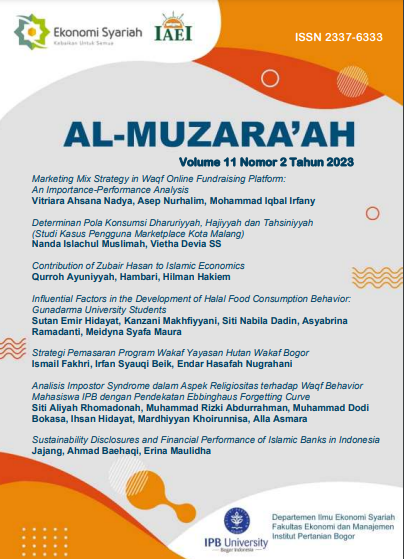Influential Factors in the Development of Halal Food Consumption Behavior: Gunadarma University Students
Main Article Content
Abstract
The purpose of this study was to determine the factors that influence the behavior of halal food consumption. The approach used in this study is a quantitative approach. The population in this study was Gunadarma students while the sample of this study was 100 people. The data collection technique in this study used questionnaire techniques. Data analysis techniques in this study use validity tests, reliability tests, descriptive analysis, and multiple linear regression tests. The linear regression test includes significance tests (F statistical tests), partial significance tests (statistical t tests) and certainty tests (R2 tests). The results of this study, partially attitudes and religiosity have a significant positive effect on halal food consumption behavior, while subjective norms/intentions and brand beliefs have an insignificant effect on halal food consumption behavior. Simultaneously the variables of attitude (X1), religiosity (X2), subjective norms/intentions (X3) and brand trust (X4) simultaneously have a significant effect on halal food consumption behavior.
Article Details
Section
Author(s) who published in this journal agree to following terms:
- Authors understand and agree that copyright of manuscripts published are held by Al-Muzara'ah. The statement to release the copyright to Al-Muzara'ah is stated in Copyright Transfer Agreement (CTA) form.
- Copyright encompass exclusive rights to reproduce, to distribute, and to sell any part of the journal articles in all form and media.
This work is licensed under a Creative Commons Attribution-ShareAlike 4.0 International License (CC BY-SA) where Authors and Readers can copy and redistribute the material in any medium or format, as well as remix, transform, and build upon the material for any purpose, but they must give appropriate credit (cite to the article or content), provide a link to the license, and indicate if changes were made. If you remix, transform, or build upon the material, you must distribute your contributions under the same license as the original.
References
Adinugraha, H. H. & Sartika, M. (2019). Halal lifestyle di Indonesia. An-Nisbah: Jurnal Ekonomi Syariah, 6(1), 57–81. https://doi.org/10.21274/an.2019.6.1.57-81.
Ali, M. (2016). Konsep makanan halal dalam tinjauan syariah dan tanggung jawab produk atas produsen industri halal. AHKAM : Jurnal Ilmu Syariah, 16(2), 291–306. https://doi.org/10.15408/ajis.v16i2.4459.
Amin, M. R. (2010). Fatwa Produk Halal Melindungi dan Menentramkan. Jakarta (ID), Pustaka Jurnal Halal.
[BPS] Badan Pusat Statistik. (2022). Jumlah Penduduk menurut Kelompok Umur dan Jenis Kelamin, Indonesia, 2022 [online]. [accesed 20 November 2023]. Retrieved from: https://sensus.bps.go.id/topik/tabular/sp2022/188/1/0.
Efendi, R. (2020). The factors of intention to buy halal-labeled food on muslim students Yogyakarta, Indonesia. Jurnal Ilmiah Ekonomi Islam, 6(1), 70–79. https://doi.org/10.29040/jiei.v6i1.514.
Endah, N. H. (2018). Perilaku pembelian kosmetik berlabel halal oleh konsumen Indonesia. Jurnal Ekonomi Pembangunan LIPI, 22(1), 25-39.
Fadilah, T. N., Purwanto & Alfianto, A. N. (2022). Tingkat pengetahuan dan produk halal dalam keputusan pembelian makanan halal. Jurnal Bisnis Dan Kewirausahaan, 18(1), 1–10. https://doi.org/10.31940/jbk.v18i1.1-10.
Farah, M. F. (2021). Consumer perception of Halal products: An empirical assessment among Sunni versus Shiite Muslim consumers. Journal of Islamic Marketing, 12(2), 280–301. https://doi.org/10.1108/JIMA-09-2019-0191.
Helmyati, S., Siagian, R. Y., Nisa, F. Z., Radhiya, S., & Yuliati, E. (2019). Predicting the halal food consumption of Indonesian moslem students: An application of theory of planned behaviour. Jurnal Gizi Dan Pangan, 14(1), 45–52. https://doi.org/10.25182/jgp.2019.14.1.45-52.
Huda, N., Hulmansyah, H. & Rini, N. (2018). Faktor yang mempengaruhi perilaku konsumsi produk halal pada kalangan mahasiswa muslim. EKUITAS (Jurnal Ekonomi Dan Keuangan), 2(2), 247–270. https://doi.org/10.24034/j25485024.y2018.v2.i2.3944.
Indrawan, B., Nurmita, N., Nengsih, T. A., Utami, W., Nasrudin, D., Tanti, T., Deliza, D., Ferawati, R., Syafitri, R., & Santoso, P. (2022). The influence of attitude and need for cognition on student’s purchase intention behavior on halal food: schools clustering perspective. Indonesian Journal of Halal Research, 4(1), 26–34. https://doi.org/10.15575/ijhar.v4i1.13092.
Jusmaliani & Nasution, H. (2009). Religiosity aspect in consumer behaviour: Determinants of halal meat consumption. ASEAN Marketing Journal, 1(2), 1-12.
Nur, F. (2021). Jaminan produk halal di Indonesia terhadap konsumen muslim. Likuid Jurnal Ekonomi Industri Halal, 1(1), 43-54.
Nurrachmi, I. & Setiawan, S. (2020). Pengaruh religiusitas, kepercayaan, dan kepuasan terhadap keputusan pembelian ulang produk halal. IQTISHADIA Jurnal Ekonomi & Perbankan Syariah, 7(2), 126-137.
Rizka, S. K., Purnamadewi, Y. L., & Hasanah, N. (2018). Produk roti dalam pola konsumsi pangan dan keberadaan label halal dalam keputusan konsumsi masyarakat (kasus: Kota Bogor). Al-Muzara’ah, 6(1), 15–27. https://doi.org/10.29244/jam.6.1.15-27.
Rohim, A. N., & Priyatno, P. D. (2021). Pola konsumsi dalam implementasi gaya hidup halal. Maro: Jurnal Ekonomi Syariah Dan Bisnis, 4(2), 26–35. https://doi.org/10.31949/maro.v4i2.1302.
Syafrida, S. (2016). Sertifikat halal pada produk makanan dan minuman memberi perlindungan dan kepastian hukum hak-hak konsumen muslim. ADIL: Jurnal Hukum, 7(2), 159-174.
Wilkins, S., Butt, M. M., Shams, F., & Pérez, A. (2019). The acceptance of halal food in non-Muslim countries: Effects of religious identity, national identification, consumer ethnocentrism and consumer cosmopolitanism. Journal of Islamic Marketing, 10(4), 1308–1331. https://doi.org/10.1108/JIMA-11-2017-0132.

